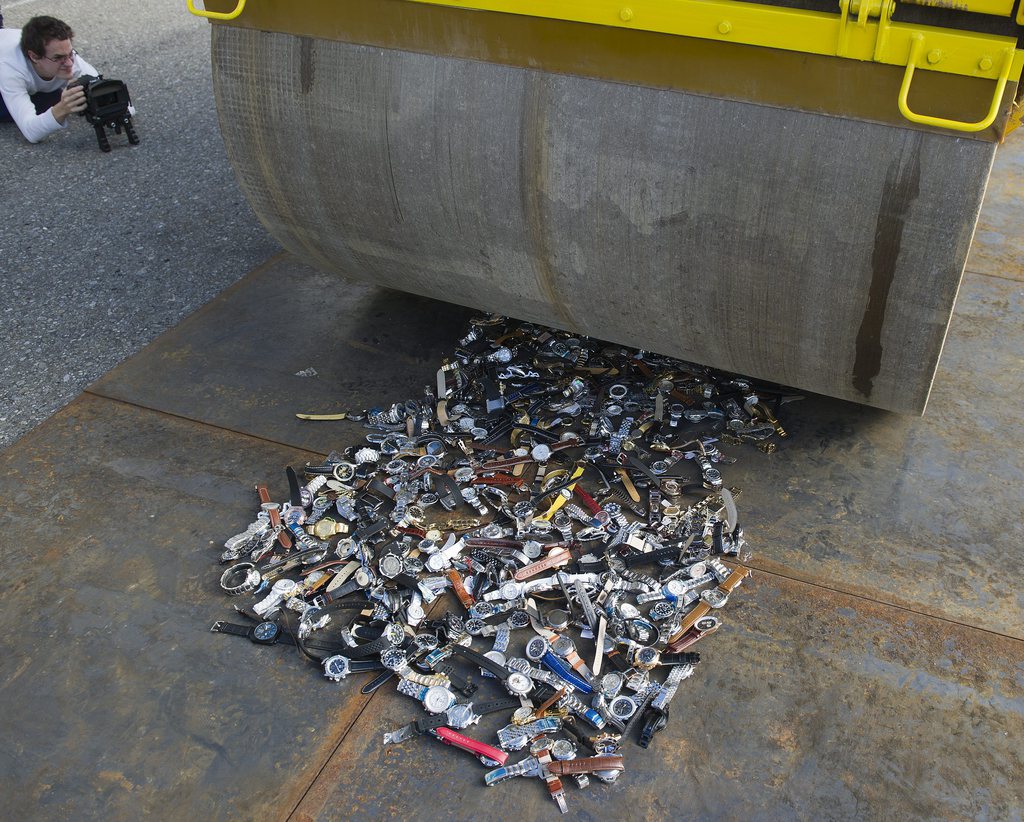Author “sets the story straight” with new book

As far as most people around the world are concerned, the Swiss excel at three things: banking, chocolate and watches. Author R. James Breiding aims to bust that myth with his new book, Swiss Made.
The book, which has the subtitle “The untold story behind Switzerland’s success”, outlines how numerous global giants were created within this small landlocked country. Yes, the Swiss produce plenty of milk chocolate but they also dominate a wide range of industries from pharmaceuticals and electrical engineering to hearing aids and cement.
Fifteen of the 500 biggest companies worldwide call Switzerland home, according to a list compiled last year by CNN Money and Fortune magazine. That’s more than many other countries, including the Netherlands, Brazil, Italy, South Korea, and Spain, all of which have significantly larger populations.
“If you Google Switzerland on Amazon, there’s just Lonely Planet guides and money laundering books,” Breiding told swissinfo.ch in a recent telephone interview. “I thought it might be interesting to try to set the story straight.”
It’s a topic close to his heart. A few years ago, he co-authored a book called Wirtschaftswunder Schweiz, which explored the economic success of Switzerland. With Swiss Made, Breiding aims to tell the story to an English-speaking public that still wrongly believes the Swiss are only focused on producing cuckoo clocks or providing questionable banking services.
His background helps him in this task. The son of a Swiss immigrant to the United States, Breiding traced his father’s steps back to Switzerland in 1984 to attend IMD Lausanne and later founded the Zurich investment firm Naissance Capital. He honed his writing skills publishing articles on Swiss topics for The Economist magazine.
Born in 1958, R. James Breiding is the son of a Swiss father and American mother and grew up in the United States. He holds master degrees from IMD in Lausanne and from the Harvard Kennedy School.
His career has focused on finance, including positions as director of Rothschild Corporate Finance and vice president at Julius Baer. In 1999, he founded Naissance Capital in Zurich with the late Dr. Francois Mayer.
In 2011, he co-authored the book Wirtschaftswunder Schweiz with Gerhard Schwarz, the director of the think tank Avenir Suisse. In 2013, he followed up with an English-language book on the same theme called Swiss Made. The book was supported by his fellowship from Harvard’s Center for International Development. Breiding holds both American and U.S. citizenship.
Resourcefulness
“By most measures, Switzerland has not been dealt the best hand for economic success,” Breiding writes. “It is a country where the only route to prosperity is human resourcefulness, because nature is little inclined to lend a hand.”
Fast forward to 2013. Switzerland continues to thrive, staving off recession that has dragged down so many others. Indeed, Switzerland is the most competitive country in the world today, according to the World Economic Forum, which awards it top rankings on everything from innovation and infrastructure to education and labour-employee relations. Unemployment is low (hovering around three per cent), while gross national income per capita is among the world’s highest at $76,400, according to the World Bank.
So what are the secrets to Switzerland’s success? Geography, for one, played a key role. Switzerland’s location as the key corridor between Germany to the north and Italy to the south, along with its diverse linguistic groups, proved a draw for immigrants from nearby countries, according to Breiding.
Swiss Made explains that these new arrivals went on to create world-famous firms. Food giant Nestlé was founded by German political refugee Henri Nestlé, Charles Brown, the son of a British immigrant, played a key role in creating the electrical-engineering company known today as ABB, an American watchmaker, Florentine Ariosto Jones, founded the IWC watch company, while more recently Nicolas Hayek of Lebanon played a pivotal role in the turnaround of the Swiss watch industry with his Swatch Group.
Risk takers
These people “tend to be much greater risk takers,” Breiding says. “They tend to define themselves and their success around their commercial achievements. That’s something Switzerland has been a beneficiary to a great extent.”
The limited opportunities within Switzerland also forced many of its citizens and companies to go abroad. The book argues that globalisation is nothing new for the Swiss.
Take Swiss chocolate, which the author claims accounted for more than a third of chocolate exports worldwide by 1900. And by 1880, embroidered lace from St Gallen accounted for CHF21million in annual exports to the United States.
The Swiss have learned it’s important to learn the local language and blend in, skills that have come in handy when it comes to integrating acquisitions, according to Swiss Made.
Downplaying Swissness
“A lot of these companies are purposely trying to downplay their Swissness,” Breiding explains. “A company like Holcim in Canada or Colombia will actually downplay the fact it’s Swiss and try to be seen as a Canadian or Colombian company.”
Switzerland’s long-standing policy of neutrality has also helped businesses thrive. The banking sector, for example, was a key beneficiary as bankers were able to provide a safe place to deposit money as war raged for centuries throughout Europe.
But the ability of the Swiss to benefit from their neutrality has also come under harsh criticism. During the Second World War, Swiss companies filled the void as suppliers to all parties, including Nazi Germany, according to the book. This gave several industries including watchmaking, chemicals and mechanical engineering a big boost. This was a finding of a special commission set up in the 1990s to investigate Switzerland’s wartime role.
As Swiss Made notes, “the war and the response of Swiss companies to the challenges and opportunities it created proved a reputational stain that continues to trouble the Swiss conscience, given its long history of humanitarian efforts.”
Fierce criticism has also been directed at Switzerland’s key banking industry, which has recently come under intense pressure from cash-strapped foreign governments seeking to track down money their citizens are hiding from the taxman. The death knell for banking secrecy has sounded in Switzerland, and financial institutions have laid off thousands of employees.
“The Swiss banks and Swiss society have been wrestling with this whole legitimacy of this business,” says Breiding.
The challenge for the Swiss will be to adapt to this financial sector shakeup and other looming changes ahead. But here again, Breiding uncovers another reason for Switzerland’s success. The Swiss have turned “adaption into a habit and disproportionate success into a routine,” Swiss Made concludes.

In compliance with the JTI standards
More: SWI swissinfo.ch certified by the Journalism Trust Initiative








You can find an overview of ongoing debates with our journalists here . Please join us!
If you want to start a conversation about a topic raised in this article or want to report factual errors, email us at english@swissinfo.ch.